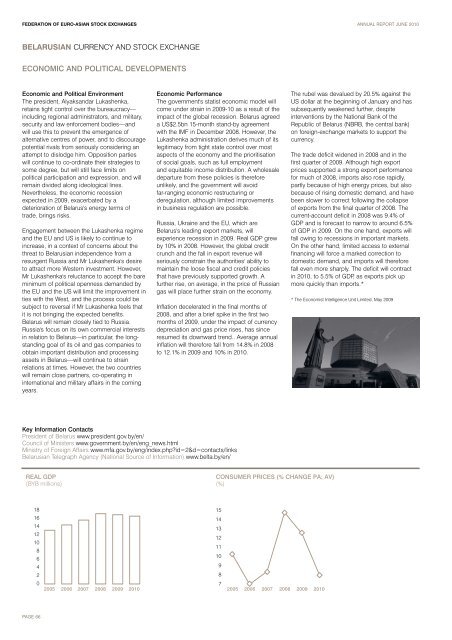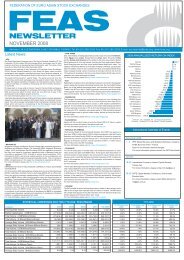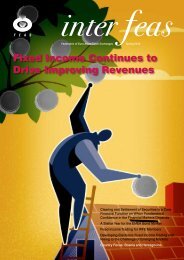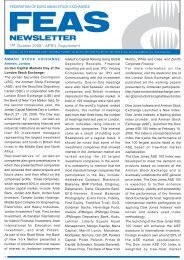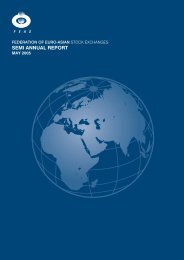Download - FEAS
Download - FEAS
Download - FEAS
- No tags were found...
Create successful ePaper yourself
Turn your PDF publications into a flip-book with our unique Google optimized e-Paper software.
FEDERATION OF EURO-ASIAN STOCK EXCHANGES ANNUAL REPORT JUNE 2010BELARUSIAN CURRENCY AND STOCK EXCHANGEECONOMIC AND POLITICAL DEVELOPMENTSEconomic and Political EnvironmentThe president, Alyaksandar Lukashenka,retains tight control over the bureaucracy—including regional administrators, and military,security and law enforcement bodies—andwill use this to prevent the emergence ofalternative centres of power, and to discouragepotential rivals from seriously considering anattempt to dislodge him. Opposition partieswill continue to co-ordinate their strategies tosome degree, but will still face limits onpolitical participation and expression, and willremain divided along ideological lines.Nevertheless, the economic recessionexpected in 2009, exacerbated by adeterioration of Belarus's energy terms oftrade, brings risks.Engagement between the Lukashenka regimeand the EU and US is likely to continue toincrease, in a context of concerns about thethreat to Belarusian independence from aresurgent Russia and Mr Lukashenka's desireto attract more Western investment. However,Mr Lukashenka's reluctance to accept the bareminimum of political openness demanded bythe EU and the US will limit the improvement inties with the West, and the process could besubject to reversal if Mr Lukashenka feels thatit is not bringing the expected benefits.Belarus will remain closely tied to Russia.Russia's focus on its own commercial interestsin relation to Belarus—in particular, the longstandinggoal of its oil and gas companies toobtain important distribution and processingassets in Belarus—will continue to strainrelations at times. However, the two countrieswill remain close partners, co-operating ininternational and military affairs in the comingyears.Economic PerformanceThe government's statist economic model willcome under strain in 2009-10 as a result of theimpact of the global recession. Belarus agreeda US$2.5bn 15-month stand-by agreementwith the IMF in December 2008. However, theLukashenka administration derives much of itslegitimacy from tight state control over mostaspects of the economy and the prioritisationof social goals, such as full employmentand equitable income distribution. A wholesaledeparture from these policies is thereforeunlikely, and the government will avoidfar-ranging economic restructuring orderegulation, although limited improvementsin business regulation are possible.Russia, Ukraine and the EU, which areBelarus's leading export markets, willexperience recession in 2009. Real GDP grewby 10% in 2008. However, the global creditcrunch and the fall in export revenue willseriously constrain the authorities' ability tomaintain the loose fiscal and credit policiesthat have previously supported growth. Afurther rise, on average, in the price of Russiangas will place further strain on the economy.Inflation decelerated in the final months of2008, and after a brief spike in the first twomonths of 2009, under the impact of currencydepreciation and gas price rises, has sinceresumed its downward trend.. Average annualinflation will therefore fall from 14.8% in 2008to 12.1% in 2009 and 10% in 2010.The rubel was devalued by 20.5% against theUS dollar at the beginning of January and hassubsequently weakened further, despiteinterventions by the National Bank of theRepublic of Belarus (NBRB, the central bank)on foreign-exchange markets to support thecurrency.The trade deficit widened in 2008 and in thefirst quarter of 2009. Although high exportprices supported a strong export performancefor much of 2008, imports also rose rapidly,partly because of high energy prices, but alsobecause of rising domestic demand, and havebeen slower to correct following the collapseof exports from the final quarter of 2008. Thecurrent-account deficit in 2008 was 9.4% ofGDP and is forecast to narrow to around 6.5%of GDP in 2009. On the one hand, exports willfall owing to recessions in important markets.On the other hand, limited access to externalfinancing will force a marked correction todomestic demand, and imports will thereforefall even more sharply. The deficit will contractin 2010, to 5.5% of GDP, as exports pick upmore quickly than imports.** The Economist Intelligence Unit Limited, May 2009Key Information ContactsPresident of Belarus www.president.gov.by/en/Council of Ministers www.government.by/en/eng_news.htmlMinistry of Foreign Affairs www.mfa.gov.by/eng/index.php?id=2&d=contacts/linksBelarusian Telegraph Agency (National Source of Information) www.belta.by/en/REAL GDP(BYB millions)CONSUMER PRICES (% CHANGE PA; AV)(%)1815161414131212101186104928072005 2006 2007 2008 2009 2010 2005 2006 2007 2008 2009 2010PAGE 66


